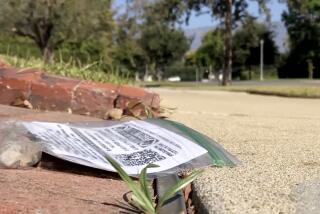Handbill Law Has Him Fighting Mad : Man Who Put Flyers on Cars Is Latest to Challenge Anaheim Rule
- Share via
Paul Dawson and his wife were stuffing blue flyers under the windshield wipers of cars parked at a Greek festival when they were interrupted by an Anaheim police officer.
“That’s illegal,” the officer said, confiscating their flyers and writing them both tickets, telling them that placing handbills on cars was in violation of an Anaheim ordinance.
“That’s a violation of the First Amendment,” countered Dawson, whose flyers included one about the political situation between Greece and Turkey.
This week, more than six years after that confrontation, Dawson is scheduled to present his case to a jury in North Orange County Municipal Court. It will be the third legal challenge in the last seven years to Anaheim handbill ordinance, originally enacted 48 years ago.
Although the city prohibits placing literature on cars, it does allows distribution face-to-face and in certain other circumstances.
‘Litter Problem’
“Normally what happens is that people come to their car, look at the handbill or don’t look at it, and throw it on the ground,” said Asst. City Atty. Mark Logan. “It ends up to be a tremendous litter problem.”
Dawson, 46, contends that the litter issue is small in comparison to the question of whether the city is within rights to restrict distribution of information in this manner.
“Flyers are a poor man’s TV or radio,” Dawson says. “The First Amendment is more powerful than the need to have a clean street.”
The American Civil Liberties Union--which represented a group of church members from Maryland who were arrested in 1985 as they were distributing literature outside Anaheim Stadium during an appearance by evangelist Billy Graham--is not involved in the Dawson case.
Anaheim officials contend that the issue in the Dawson case is consent, not content.
When a handbill is offered to someone face-to-face, Logan said, a person has the opportunity to refuse the literature. Similarly, he said, if someone is bothered by handbills being left on the front door, that person can call the source and ask to be removed from the delivery list. When a handbill is left on a car, however, he argued, it is done without the owner’s consent and with no opportunity to refuse it.
“We’re not trying to prevent anybody from espousing their views,” Logan said. “This is just to limit the inconvenience and cost” related to trash clean-up.
Dawson concedes that people today are inundated with unsolicited literature, but he contends, nevertheless, that distributing handbills should not be a crime.
At the time they were issued their tickets, Dawson was operating a handbill distribution business that catered to ethnic communities. The flyers distributed at the Greek festival were intended for the Greek community and carried advertisements for insurance agents, hair salons, restaurants and other services, “In ethnic communities, people are used to getting flyers,” Dawson said. “It’s a form of communication.”
Angered by the citation, Dawson did not appear when he was supposed to. A judge later issued a warrant for his arrest.
He did not learn of the warrant until earlier this year, after he was issued a traffic ticket. He then decided to fight the handbill citation in court.
With the help of the legal tomes that are for sale in his bookstore, Dawson researched the topic of handbill distribution without the help of a lawyer. Nick Thompson, the public defender assigned to Dawson’s case, did not return calls about it.
“I can’t believe they want to punish me and my wife for this when there’s no room in the jails now,” Dawson said.
The International Society of Krishna Consciousness successfully sued the city in 1982 in a case revolving around the distribution of handbills at Anaheim Stadium. The city was ordered to pay $78,000 in legal costs to the organization, and the city then modified its ordinance to allow handbill distribution at the stadium and other public places, but added a requirement that distributors wear badges or some other form of identification.
The most recent change in Anaheim’s handbill ordinance came this month, when the City Council voted unanimously to outlaw the distribution of handbills on hotel room doors.
More to Read
Sign up for Essential California
The most important California stories and recommendations in your inbox every morning.
You may occasionally receive promotional content from the Los Angeles Times.










